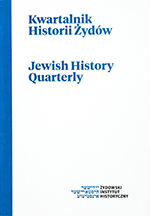Między ortodoksją a umiarkowaną reformą – rabin i kaznodzieja Moritz Duschak (1815-1890) i jego poglądy na judaizm
Between Orthodoxy and Moderate Reform – Rabbi and Preacher Moritz Duschak (1815-1890) and his Views of Judaic Faith
Author(s): Alicja Maślak-MaciejewskaSubject(s): History, Jewish Thought and Philosophy, History of Judaism
Published by: Żydowski Instytut Historyczny
Keywords: Moritz Duschak; Galicia; Moravia; progressive Judaism; positive-historical Judaism;, Zachariasz Frankel; Kraków; progressive synagogue; Judaism reformed; religious education
Summary/Abstract: The article deals with the activities of the rabbi and preacher Moritz Duschak (1815-1890) and his views of the Judaic faith. Duschak spent all his life in the Habsburg lands, at first he worked in Moravia (in Habern, Aussee, Gaya communes) and later in Kraków, where for more than a decade (1877-1888) he worked as a preacher of the progressive synagogue, the so-called Tempel. Duschak was a modern religious leader. He combined religious education, obtained in a purely orthodox spirit (he was Khatam Sofer’s disciple) with lay academic pursuits (he had a doctor’s degree from Prague University). He was famous for his numerous publications, primarily on the Halakha and Talmud.Duschak was firmly opposed to a radical reform of Judaism, and articulated his opposition first of all in the pamphlet entitled Peria, Sabbath und Doppelfeier, published in response to the discussions taken up during the conference of rabbis in Breslau in 1846. In his views of Judaism he came quite close to Zacharias Frankel. Just like him,, he objected to radical reform while advocating limited changes, ensuing from the recognition of the historic nature of Judaism (the so-called positive-historical Judaism). Therefore Duschak backed the introduction of moderate reforms to the synagogue, largely limited to the external aspects of the services and to decorum; we also supported the introduction of modern sermons delivered in German. This article analyses Duschak’s activity, from his youth and education, to work in the Moravian communities, to his activity in Kraków. In that town he not only worked as a progressive teacher but also engaged in religious education of youth, charitable work and the extension of the operations of the Israelitische Allianz zu Wien to Kraków.
Journal: Kwartalnik Historii Żydów
- Issue Year: 263/2017
- Issue No: 03
- Page Range: 443-469
- Page Count: 27
- Language: Polish

